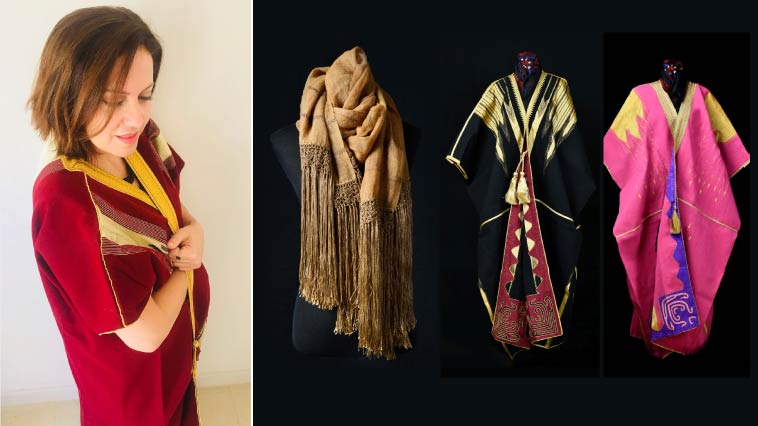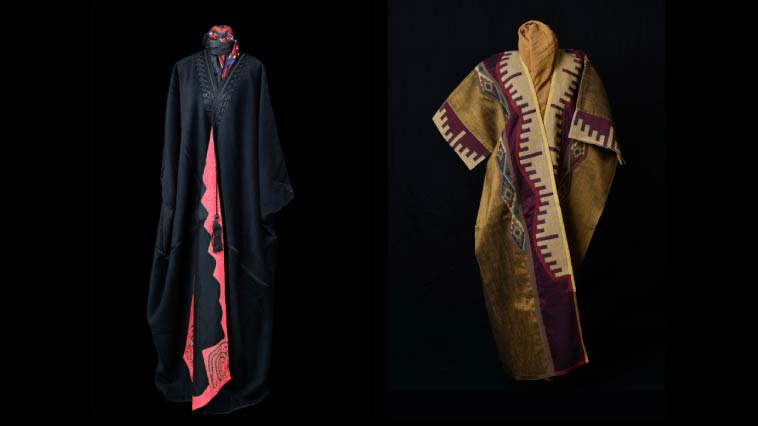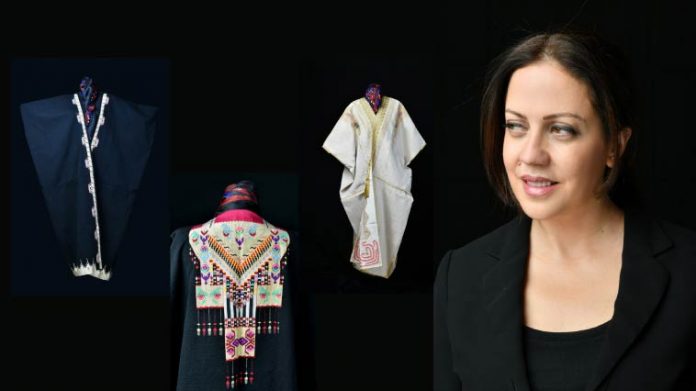Listening to the passion with which Amal speaks about the traditional artistry used to create the stunning pieces in her collections for Amal’s Abayas & Loafers, it’s no surprise to learn that she grew up around the business, which was started in Lebanon by her mother back in the 1980s.
A working mum with children to raise, Elham Charabati drew on Lebanon’s artisanal heritage using handloomed cloth to design and manufacture gorgeous, colourful traditionally cut abayas that, from small beginnings, gained a worldwide following – supermodel Claudia Schiffer even wore one of Elham’s designs when she met the Lebanese president.
Amal says: “She took the traditional abaya and added pockets or small embellishments to give it a funky twist. She appreciated the importance of tradition, so she didn’t try to change the cut but she did manage to change the whole look to make her abayas more modern.”
However, until her mother’s sudden death in 2013, Amal, a respected communications professional, had no intentions of joining the family firm. She explains: “I had always been interested. I was very close to my mother and I grew up as she was building the business, so I knew all about it. I did think I would love to do something like this, but I am also passionate about my work in communications. But, when my mother passed, I realised that I have never really tested my creativity — you have to test yourself. I thought that maybe I have something hidden within myself that I needed to explore.”
Living in Bahrain and with none of the close family left in Lebanon, she was forced to close her mother’s shop. But, after taking time to grieve, she decided she would set about carrying on her mother’s legacy by working with Lebanon’s artisan weavers on a range of traditional abayas for modern women.
 She says: “Of course, I knew all the craftsmen my mother had worked with but, when I contacted them, many had retired. I asked if they had passed their skills on to their children, but they mostly said no. So, although there were some of the workforce left, I had to go and find new artisans to work with – and, obviously, you have to make sure you have the right quality, which is what we’re known for.
She says: “Of course, I knew all the craftsmen my mother had worked with but, when I contacted them, many had retired. I asked if they had passed their skills on to their children, but they mostly said no. So, although there were some of the workforce left, I had to go and find new artisans to work with – and, obviously, you have to make sure you have the right quality, which is what we’re known for.
“It’s very sad that people no longer look so much to buy handmade – they want designer names and will pay USD500 for a machine-made T-shirt but then will say my designs are expensive. That’s why I have created a small label, which goes on each piece, thanking people for helping to keep handmade alive. And, on my Facebook and Instagram pages, I have pictures of the workers at the loom, explaining how my cloths are made – once people realise the labour and skill involved, they no longer think my pieces are expensive. If you look at them, they are investment pieces. With some, the embroidery takes two or three months for each piece and the gold is actual gold plate.
“If people don’t support traditional crafts, the artisans cannot make a living and skills will die out. I have promised myself that I will keep using the traditional techniques and not go to machine production, which was a promise my mother also made.”
 For the future, Amal is about to release a new collection, at the end of August. And, taking into account her Bahrain location, it will feature more lightweight cotton pieces alongside the heavier Lebanese weaves. You can find her at exhibitions and pop-up markets around the Kingdom and on Facebook and Instagram @amalsabayasandloafers and she is also planning to launch her own website in the coming months.
For the future, Amal is about to release a new collection, at the end of August. And, taking into account her Bahrain location, it will feature more lightweight cotton pieces alongside the heavier Lebanese weaves. You can find her at exhibitions and pop-up markets around the Kingdom and on Facebook and Instagram @amalsabayasandloafers and she is also planning to launch her own website in the coming months.


































